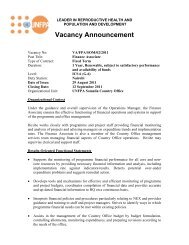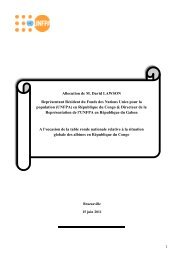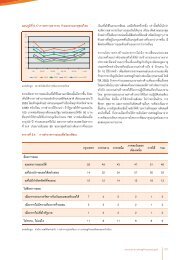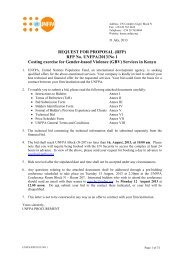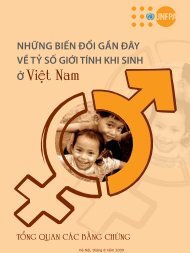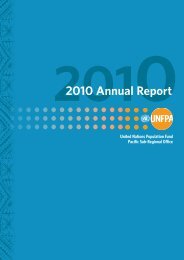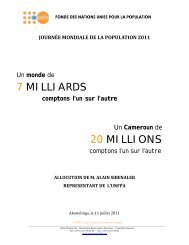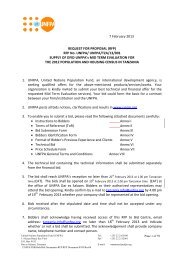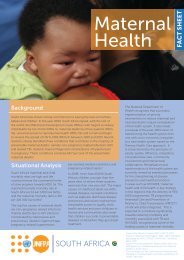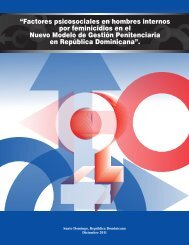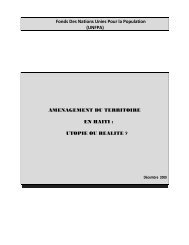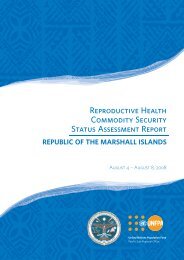English
English
English
Create successful ePaper yourself
Turn your PDF publications into a flip-book with our unique Google optimized e-Paper software.
UNFPA Somalia Country Office<br />
SAMOFAL<br />
Solidarity in Crisis<br />
Issue Number 10, October 2012<br />
Somalia Country Office<br />
Midwifery<br />
school opened in<br />
Mogadishu<br />
UNFPA Somalia Country Office<br />
welcomes our Regional Director<br />
Hafedh Chekir for his last visit to<br />
Somalia together with his guest<br />
of honor, Assistant Secretary<br />
General and Deputy Executive<br />
Director of Management UNFPA,<br />
Ms. Anne-Birgitte Albrectsen.<br />
Ms. Albrectsen joined UNFPA<br />
earlier this year and brings with<br />
her nearly 20 years of management and development<br />
experience, having held leadership positions in her<br />
nations’ Government and previously in the United<br />
Nations Development Programme (UNDP) and<br />
UNFPA. Mr. Chekir and Ms. Albrectsen will visit Somali<br />
Government officials as well as UNFPA projects.<br />
Mogadishu School of Midwifery opening ceremony<br />
Delivery of maternal health<br />
services in Somalia is greatly<br />
hampered by a lack of welltrained<br />
health personnel, exacerbated<br />
by an exodus and creased production<br />
of health workers. This shortage of<br />
professional health workers calls for<br />
increased production of accessibility to<br />
professional services. UNFPA started<br />
the professional training of midwives in<br />
Somalia in 2007. To date sis schoools<br />
are functioning in the whole country.<br />
As well as needing to increase the<br />
overall number of<br />
health workers, it<br />
is also essential to<br />
provide additional<br />
training to existing<br />
personnel in order<br />
to further build their<br />
capacity in core<br />
areas of midwifery<br />
competencies<br />
as updated by<br />
the International<br />
Confederation of<br />
Midwives in 2011.<br />
With all the above<br />
problems the<br />
number of skilled<br />
midwifes in Somalia<br />
are very limited<br />
and in this regard,<br />
2012 is a milestone<br />
in midwifery training in Mogadishu.<br />
WAHA (Woman and Health Alliance<br />
International) and UNFPA in consultation<br />
with ministry of health Somalia are set<br />
to train 20 nurses to obtain post basic<br />
midwifery diploma in an 18 month<br />
course.<br />
Although the midwifery training in<br />
Mogadishu ceased with the falldown<br />
of central government, the training<br />
of nurses continue in some local<br />
institutes, especially the private and<br />
NGOs supported ones. This resulted in<br />
as accumulation of a pool of nurses in<br />
Mogadishu and South Somalia.<br />
There are also a limited number of<br />
hospitals offering comprehensive<br />
emergency obstetric care. With the<br />
establishment of Hanano Hospital and<br />
soon-to-come Forlanini Hospital, both<br />
offering free comprehensive emergency<br />
obstetric care (Cemoc) and the<br />
resultant high turn-over, a new handson<br />
experience under supervision of<br />
experienced obstetrician-gynecologists,<br />
midwives and clinical instructors is<br />
bound to bring out the best in the postbasic<br />
midwife trainees.<br />
A Post-basic Midwifery School will<br />
be established within the hospital so<br />
as to train additional local staff in an<br />
accelerated intensive one year course<br />
based on the curriculum developed by<br />
UNFPA in Somaliland and in agreement<br />
with the local Ministry of Health. This<br />
school will train additional local staff for<br />
the two hospitals of this project as well<br />
as to work in particular in primary health<br />
care facilities throughout the country.<br />
Trainees will be chosen in collaboration<br />
with the UNFPA and the Ministry of<br />
Health, and to have a good country-wide<br />
representation from the various regions.<br />
It targets general nurses already having<br />
Read more on page 2.<br />
SAMOFAL - Solidarity in Crisis 1
UNFPA Somalia Country Office<br />
basic diplomas. Currently, consultancies are being processed to<br />
initiate the groundwork, which will include a rigorous selection<br />
process of potential candidates from across the different<br />
regions of Somalia, interviews, ToT training, acquisition of<br />
training material, stationary, and other administrative duties.<br />
Renovations and furnishing are also being done in the proposed<br />
house to host the students and some of the tutors.<br />
This course is designed to prepare competent Midwives<br />
especially in post-basic midwifery, reproductive health, mother<br />
and child care, and community health in general, in order to<br />
prepare them for work in hospitals, maternal and child health<br />
centers and dispensaries.<br />
Students in one of the boarding rooms in Mogadishu School of Midwifery<br />
Syndromic Case Management training in Puntland<br />
2<br />
SAMOFAL - Solidarity in Crisis<br />
Sexual Transmitted Infections (STI) is a<br />
common and serious problem worldwide.<br />
The most widely acknowledged are<br />
gonorrhea, syphilis and the human<br />
immunodeficiency virus (HIV). Many<br />
of these are curable with effective<br />
treatment, but they continue to be<br />
a major public health concern in the<br />
general population, particularly in<br />
vulnerable groups e.g. IDP communities.<br />
Syndromic case management offers<br />
many benefits in this effort. It enables<br />
STI service providers to diagnose STI<br />
syndrome and treat patients on the spot,<br />
without waiting for the results of time<br />
consuming and costly laboratory tests.<br />
By offering treatment on the patient’s<br />
first visit, it will help to prevent the<br />
further spread of STIs. It is also involved<br />
in patient education about the infection,<br />
how STIs are transmitted, the risky sexual<br />
behavior and how to reduce the risks,<br />
partner management and the provision of<br />
condoms.<br />
The UNFPA supported project, involves<br />
strengthening Behavior Change<br />
Communication and Information<br />
Education and Communication for<br />
vulnerable groups, strengthening<br />
Reproductive Health and STI services<br />
through capacity building of health care<br />
providers in Puntland.<br />
One training were held in Bosasso in<br />
June, for 14 health workers, including<br />
certified nurses, midwives, counselors<br />
and lab technicians from the IDP<br />
settlements in Bari and Karkar Regions.<br />
Another was held in Galkayo in July, with<br />
10 health care providers from 6 districts<br />
in Mudug and Nugal regions. The<br />
training included six days of class session<br />
and eight days for field visit in MCH.<br />
Both workshops were implemented by<br />
PNMA (Puntland Nurses and Midwives<br />
Association) and funded by UNFPA<br />
Somalia Country Office.
UNFPA Somalia Country Office<br />
Settling the status of the population in Somalia<br />
The transition<br />
is over.<br />
Monday<br />
10 of September,<br />
the Somali people<br />
took a giant step<br />
forward on the<br />
path to peace<br />
and prosperity,<br />
and ended the<br />
transitional period<br />
decisively by<br />
selecting their next<br />
President. Somalis<br />
have to focus<br />
on stabilization,<br />
reconciliation<br />
and building<br />
sustainable and<br />
accountable<br />
institutions of<br />
governance capable of providing services<br />
to their people. In order to make good<br />
decisions for the people they serve,<br />
access to good data is essential for<br />
policy makers. Data enables countries to<br />
measure progress, or lack of it.<br />
Somalia had a long absence of any form<br />
of reliable data system that supports<br />
humanitarian, recovery or development<br />
actions since the collapse of the central<br />
government in 1991.The last population<br />
census was done in 1985/86, but no<br />
data was released. Only a few data<br />
were released from the earlier census<br />
conducted in 1975. A settlement<br />
survey was done by United Nations<br />
Development Program back in 2005/06,<br />
but the Somali administration came out<br />
against it, because they felt that their<br />
population had been underestimated.<br />
Nevertheless, those data has been used<br />
as a framework for designing surveys<br />
until now.<br />
It would be ideal to conduct a<br />
comprehensive population census for<br />
Somalia. However, basic requirements<br />
for conducting an internationally credible<br />
census cannot be met at the current<br />
stage because of concerns of national<br />
capacity and regarding security and<br />
stability in the central and southern parts<br />
of Somalia. A population survey along<br />
with mapping and estimation procedures<br />
is the most practical option at this stage.<br />
So the time has come to settle the<br />
status, once and for all. The Population<br />
Somalis during an awareness campaign against FGM/C in Somaliland<br />
Fund (UNFPA) is man-dated by UN to<br />
support governments in using population<br />
data for policies and programs. Together<br />
with the Somali governments and in<br />
partnership and collaboration with<br />
the UN agencies the time is right for<br />
conducting a Population Estimation<br />
Survey. “Numbers tell us about people.<br />
This Population Estimation Survey will<br />
provide critical data to guide plans,<br />
policies and programmes to meet the<br />
Somali people’s need and improve their<br />
lives” said UNFPA Representative, Cheikh<br />
T. Cisse<br />
The primary objective of the survey is to<br />
obtain reliable population estimates of<br />
Somalia that are classified by geographic<br />
areas, regions, districts and water<br />
points, and by demographic and some<br />
socioeconomic characteristics including<br />
age, sex, educational status, employment<br />
and access to safe water and mobility<br />
status. For all<br />
development<br />
partners, data<br />
is essential in<br />
demonstrating<br />
measurable results<br />
and accountability,<br />
particularly as it<br />
relates to funding<br />
and management.<br />
“If the numbers<br />
are wrong we<br />
might be wrong,<br />
Heads of UN agencies at the PES workshop - Nairobi<br />
so this is a top priority for us” said FAO<br />
Representative Luca Alinovi, during<br />
a workshop in September. His view<br />
is shared by other UN agencies. “We<br />
need to know how many kids that<br />
are born, and how many died. This is<br />
very important for us” said UNICEF<br />
Representative, Sikandar Khan. “This is<br />
fundamental, since we are working with<br />
human population needs” said WFP<br />
Representative, Stefano Porretti.<br />
The priority given by the national<br />
authorities for conducting this survey,<br />
formed the biggest motivation for the<br />
international organizations, represented<br />
by WFP, UNDP, UNICEF, UNHCR, FAO<br />
and WHO to adopt this initiative towards<br />
achieving greater coordination and<br />
integration between these organizations<br />
in support of national sustainable<br />
development efforts.<br />
SAMOFAL - Solidarity in Crisis 3
UNFPA Somalia Country Office<br />
Reproductive Health kit distribution in Puntland<br />
UNFPAs Abdinasir Mohamed handing over<br />
Reproductive Health kits to Ali Diriye from the<br />
Ministry of Health.<br />
UNFPA donated Reproductive Health kits<br />
to the Ministry of Health in Puntland and<br />
this was distributed to the health services<br />
delivery points in Puntland at the end of<br />
May.<br />
This was a part of UNFPA’s commitment<br />
towards reducing maternal mortality in<br />
partnership and collaboration with the<br />
Ministry of Health in Puntland towards<br />
achieving the Millennium Development<br />
Goals number 4 and 5, in capacitating<br />
and expanding health care providers and<br />
providing Reproductive Health kits.<br />
Acting Director General of the Ministry<br />
of Health, Mr. Ali Diriye, welcomed the<br />
donation saying that many hospitals<br />
were facing Reproductive Health drug<br />
shortage. He highlighted that this<br />
Reproductive Health kits will help in<br />
saving lives of our mothers, which in turn<br />
will positively affect in reducing maternal<br />
mortality.<br />
Celebration of the Youth Day of Puntland<br />
International Youth Day is on August<br />
12 each year. It is celebrated in all over<br />
the world. It is meant as an opportunity<br />
for governments and others to draw<br />
attention to youth issues worldwide.<br />
The day was observed and celebrated in<br />
Puntland State University in Garowe and<br />
other major towns of Puntland.<br />
Many activities and events took place<br />
during the commemoration, in order to<br />
promote the benefits that young people<br />
bring into the world. Many people<br />
participated in the activities and events<br />
that took place during this global event,<br />
which included youth conferences on<br />
issues such as piracy, human trafficking,<br />
employment, education, HIV/Aids and<br />
others.<br />
President H.E. Abdirahman Mohamed Faroole addressing the youth<br />
Other activities including concerts<br />
promoting the world’s youth, as well<br />
as sporting event like football match.<br />
Among the participants were the<br />
President of Puntland, H.E. Abdirahman<br />
Mohamed Faroole, Minister of Labour<br />
Youth and Sports, Mr. Abdiweli Hersi, and<br />
Minister for Planning and International<br />
Cooperation, Mr. Daud Mohamed Omar.<br />
UNFPA staff and Y-Peer Network<br />
members were also present at the<br />
event. The aforementioned honorable<br />
people have accentuated a lot during<br />
the conference meeting that young<br />
people today face pressing global<br />
challenges such as human trafficking,<br />
HIV/AIDS, vulnerable working conditions<br />
and marginalization from decision<br />
Youth were commemorated in speeches<br />
making processes and also face<br />
immense challenges in every aspect<br />
of their lives especially high numbers<br />
of unemployment, it leaves the youth<br />
idle and prone to illegal activities like<br />
piracy. The president highlighted more<br />
Youth participated in sporting activities<br />
specifically that partnerships such as<br />
governments, NGOs/UN agencies, the<br />
private sector and civil society can help<br />
increase opportunities for success by<br />
leveraging comparative advantages,<br />
resources and shared interests.<br />
4<br />
SAMOFAL - Solidarity in Crisis
UNFPA Somalia Country Office<br />
Election of youth delegate<br />
run-off race against Faduma Abdule<br />
who will serve as an alternate.<br />
Members of the Youth Community during the nomination for youth delegate to the UN<br />
Somali Family Services (SFS), in<br />
collaboration with the United Nations<br />
Population Fund (UNFPA), hosted<br />
members of the Garowe youth<br />
community at the Puntland Library and<br />
Resource Center on 6th of August to<br />
elect a representative to the Somalia<br />
United Nations Country Team (UNCT)<br />
Youth Advisory Panel (YAP). 18 young<br />
men and women attended the event,<br />
representing youth organizations<br />
from around Garowe. Five candidates,<br />
four men and one woman, delivered<br />
compelling speeches to contend for the<br />
vote of their peers and participants voted<br />
by secret ballot in a fair and transparent<br />
election process.<br />
After a tie in the initial election,<br />
Abdirahman Jama emerged as the<br />
elected YAP representative in a close<br />
The Youth Advisory Panel will<br />
promote meaningful dialogue<br />
between Somali youth and the UNCT,<br />
serving as a platform to involve the<br />
youth in advising the UN to design<br />
youth-friendly strategies, policies<br />
and programs. The participants<br />
discussed the political, social and<br />
economic issues affecting youth,<br />
especially focusing on human<br />
rights, civic education, political<br />
inclusion, economic opportunities<br />
and entrepreneurship. They also<br />
reviewed the Somalia Youth Charter<br />
and discussed its compatibility to the<br />
needs of youth communities.<br />
This forum in Garowe is part of an<br />
ongoing SFS effort to identify qualified<br />
youth to represent Puntland in the UNCT,<br />
and similar forums have been held in<br />
Bosaso and Galkayo. Of the five youth<br />
elected to join the YAP from Puntland,<br />
two come from an IDP and minority<br />
group, with the other three elected to<br />
represent their respective hometowns of<br />
Bosaso, Galkayo and Garowe.<br />
Maternal Health Mission to Somaliland and Puntland<br />
RH commodity security and HIV/AIDS<br />
prevention, and to assist UNFPA Somalia<br />
in developing a comprehensive maternal<br />
health and RH commodity security<br />
programme.<br />
The mission travelled to Hargeisa,<br />
Galkayo and Garowe. It met with the<br />
health authorities, partner organisations<br />
and UNFPA field staff. The mission<br />
members visited several hospitals,<br />
MCHs, maternity waiting homes, private<br />
pharmacies and warehouses, and nursing<br />
and midwifery institutions.<br />
RH mission to Somalia, Rogaia Abdelrahim, Sennen Hounton, Kabir Ahmed, Maha Eladawy and Ruth Pfleiderer<br />
In September 2012, UNFPA undertook<br />
a maternal health mission to Somalia.<br />
Participants came from the UNFPA<br />
headquarters in New York, the regional<br />
office in Cairo and the country office in<br />
Nairobi. The objective of the mission was<br />
to do a rapid situation assessment of<br />
basic reproductive health (RH) services,<br />
Findings and recommendations included:<br />
strengthening RH coordination and<br />
management; introducing a birth spacing<br />
programme in Somalia; strengthening the<br />
capacity for quality emergency obstetric<br />
care; scaling up of the midwifery<br />
programme; training doctors to do fistula<br />
repairs; ensuring that health information<br />
management systems include maternal<br />
health data.<br />
SAMOFAL - Solidarity in Crisis 5
UNFPA Somalia Country Office<br />
Humanitarian Response<br />
An expectant mother during the UNFPA support -<br />
Somalia<br />
Despite the progress made since<br />
famine was declared in parts of<br />
Somalia, the number of people<br />
in crisis still remain very high, 2.12<br />
million people in urgent need of aid,<br />
according to the latest data released<br />
by the Food Security and Nutrition<br />
Analysis Unit (FSNAU) and Famine Early<br />
Warning Systems Network (FEWSNET).<br />
Hundreds of thousands of displaced<br />
women are currently living in camps<br />
where protection concerns are very<br />
high, notably on gender based violence.<br />
The majority of the affected population<br />
is in the south of the country, where<br />
assistance is extremely limited due to<br />
high level of insecurity. The community’s<br />
poor resistance to the drought coping<br />
had resulted the massive population<br />
movement throughout the region, most<br />
of them in Lower and Middle Shabelle<br />
and in Banadir.<br />
Overall, notwithstanding the recent<br />
improvements, the humanitarian situation<br />
in Somalia remains critical and must<br />
remain on the global agenda to avoid the<br />
risk of reversing the gains made. In the<br />
second half of 2012, humanitarian actors<br />
are prioritizing lifesaving responses, as<br />
well as interventions aimed at rebuilding<br />
livelihoods and resilience to reduce<br />
the effects of hazards. The situation in<br />
Mogadishu has changed rapidly in the<br />
past few months. While security, and<br />
therefore access has relatively improved,<br />
profound humanitarian challenges remain<br />
as population continues to influx to the<br />
city from Afgooye corridor and other<br />
regions due to conflict.<br />
The Existing IDP settlements have<br />
expanded considerably resulting to<br />
overcrowding and straining of the already<br />
overburdened service delivery. The<br />
standoff between TFG/AMISOM and<br />
Al Shabaab for the control of Afgooye<br />
corridor is causing a state of uncertainty<br />
among the population, thus affecting<br />
agricultural activity in the corridor and<br />
the return process. (Source OCHA<br />
Somalia).<br />
The target areas were selected based<br />
on the needs and the extents of<br />
vulnerability of the newly arrived IDPs<br />
were most vulnerable in Lower and<br />
Middle Shabelle and in Banadir. UNFPA<br />
Somalia contracted 3 local NGOs, each<br />
in one of the 3 target regions to provide<br />
2,650 kits. The distribution, that took<br />
place in the second week of August,<br />
was targeting pregnant women (45%<br />
of the kits); lactating women (25%);<br />
adolescent unmarried girls of the age of<br />
12-17 (30%). UNFPA staff had rounds of<br />
discussion with local NGOs in the target<br />
areas during protection cluster meetings<br />
to have an agreement on the contents.<br />
Dates which was included in the dignity<br />
kits supported by UNFPA in 2011 was<br />
agreed to be an important element but<br />
because of the limitation of funds it was<br />
not in the kit.<br />
The newly arrived IDPs based in the new<br />
camps are undergoing very hardship<br />
condition; they are based in open camps<br />
with no shelter, no clean water, and no<br />
health care and above all in adequate<br />
clothing and hygiene supplies. Pregnant<br />
women are among the most affected<br />
part of the new IDPs. No protection for<br />
women and children against the chilly<br />
weather in the night and sun heat during<br />
the day. The recently liberated areas<br />
which are the target of this project (lower<br />
and middle Shabelle) remained for long<br />
time under Al-Shabaab who induced<br />
a dress code for women and thus it<br />
became an important security measure<br />
for women to wear such kind of dress if<br />
she has to go outdoors to reach the food<br />
distribution points.<br />
6<br />
Women queing up for distribution of Dignity Kits in Lower Shabelle - Somalia<br />
SAMOFAL - Solidarity in Crisis<br />
The content of the Dignity Kit was<br />
improved with the inclusion of a torch
UNFPA Somalia Country Office<br />
and a whistle. These two items were<br />
strongly recommended by the Protection<br />
Cluster, as they contribute in the<br />
prevention of gender based violence. In a<br />
context where insecurity is at its highest<br />
level, these daily life tools raise attention<br />
on the potential victim in a situation of<br />
extreme emergency, saving the life of<br />
girls and women. All the community<br />
benefitted from the activity: not only girls<br />
and women, but also the larger family,<br />
the IDP community as well as local<br />
business men because the products were<br />
procured locally.<br />
The main challenge concerned the<br />
small amount of kits that the NGOs<br />
were entitled to distribute. Distribution<br />
of dignity kits was implemented<br />
successfully, the targeted areas were<br />
reached and beneficiaries were satisfied<br />
with this operation as it occurred in a<br />
period where people are facing lack of<br />
clothing and hygiene supplies. One of<br />
the positive aspects of the project is the<br />
involvement and adherence of authorities<br />
and beneficiaries as well, toward the<br />
achievement of the objectives targeted<br />
by Emergency assistance for protection<br />
of pregnant women affected by droughts<br />
in new IDP camps project. For further<br />
Dignity kit distribution implementation<br />
there is need to increase on the quantity<br />
of kits in order to ensure large coverage<br />
of South Central region where the most<br />
vulnerable women are. ‘’I will like to<br />
thank UNFPA for restoring our dignity, I<br />
could not go to the town for casual work<br />
because I did not have cloth to cover my<br />
body, and stayed indoors this make shift<br />
in my life thanks God I can go to town<br />
to do casual work of washing cloths and<br />
cleaning dishes to feed my children.’’<br />
(Beneficiary from Afgyoee)<br />
Women receiving Dignity Kits - Somalia<br />
Improving Maternal Health<br />
through Joint Programme<br />
Protecting women lives through prenatal care<br />
UNFPA, UNICEF and WHO are<br />
jointly implementing a Health and<br />
Nutrition Programme (JHNP). This is<br />
a comprehensive multi-donor, multipartner<br />
five year programme aimed<br />
towards achieving the Millennium<br />
Development Goals (MDGs). In<br />
particular, it aims at improving maternal<br />
and child health and reducing mortality,<br />
while strengthening the systems that<br />
support improved quality and access to<br />
health care. While scaling up the delivery<br />
of essential reproductive, maternal,<br />
newborn and child health (RMNCH) and<br />
nutrition services for women, young girls,<br />
and children in Somaliland, Puntland<br />
and South-central Somalia, the JHNP<br />
addresses the WHO six building blocks<br />
for efficient health systems functioning,<br />
building and strengthening foundations in<br />
order to improve the health and nutrition<br />
status of Somali people.<br />
The JHNP was developed through a<br />
wide consultation process, involving<br />
a wide range of key stakeholders. The<br />
Programme emphasises the increased<br />
leadership capacity of Somali health<br />
authorities, with support aligned<br />
to health sector strategic planning.<br />
Joint Programming by the three UN<br />
agencies ensures that the strengths of<br />
each agency are harnessed. Activities<br />
supported by UNFPA, UNICEF and WHO<br />
complement each other, ultimately<br />
leading to increased programme<br />
effectiveness.<br />
UNFPA has a major role to play within<br />
the JHNP, and supports a range of<br />
activities. In 2012, UNFPA has been<br />
strengthening the leadership and<br />
governance of the health sector<br />
through training of reproductive health<br />
(RH) managers and support to RH<br />
coordination units. Maternal health can<br />
only be improved through an increase in<br />
safe deliveries. This means that all births<br />
should be attended by a skilled birth<br />
attendant (doctor, midwife). A skilled<br />
health workforce is a key element in<br />
ensuring the provision of quality services.<br />
Therefore, UNFPA is supporting the<br />
training of new midwives in midwifery<br />
schools in all three zones of Somalia.<br />
Maternal deaths are often caused by<br />
complications during delivery. Health<br />
workers can only be effective if they have<br />
the necessary skills. They need to be able<br />
to identify problems, and to effectively<br />
address them. Therefore, UNFPA<br />
provides training in Emergency Obstetric<br />
Care (EmOC).<br />
In addition, health workers need the<br />
supplies and equipment to do their work.<br />
UNFPA has been procuring a range of<br />
reproductive health commodities to<br />
ensure safe deliveries. Not all population<br />
groups have equal access to delivery<br />
services. UNFPA has established several<br />
maternity waiting homes in areas where<br />
internally displaced persons (IDPs) live,<br />
and this has increased the number of<br />
women who go to health facilities for<br />
their delivery. UNFPA reported on this in<br />
the last issue of SAMOFAL.<br />
All good programmes have something<br />
in common. They measure their<br />
results. Regular monitoring leads to<br />
improvements in programmes. In order<br />
to do this effectively, it is necessary to<br />
know the current situation, the baseline.<br />
UNFPA therefore has been supporting<br />
research in Somaliland and Puntland: a<br />
reproductive health rapid assessment<br />
in IDP camps, and a birth spacing<br />
knowledge, attitude and behaviour<br />
survey.<br />
SAMOFAL - Solidarity in Crisis 7
UNFPA Somalia Country Office<br />
Fistula repairs in Mogadishu<br />
Doctors Carried out a successful Caesarean section at a hospital in Mogadishu<br />
Women in Somalia live in a<br />
highly insecure context where<br />
the health infrastructure<br />
has been disrupted for decades and<br />
where aid for maternal health has been<br />
extremely limited. There have been no<br />
fistula care services within Somalia and<br />
all recent treatment strategies have relied<br />
on transporting women to Puntland or<br />
Somaliland, or have depended on women<br />
traveling to neighboring countries such<br />
as Ethiopia. A major barrier to providing<br />
fistula treatment in Somalia is a lack<br />
of appropriate facilities to conduct<br />
the operations, including insufficient<br />
equipment and medical supplies, and<br />
a dearth of trained personnel required<br />
for the surgery as well as for the preoperative<br />
and post-operative care.<br />
There is an urgent need for a holistic<br />
and comprehensive approach to<br />
delivering maternal health services<br />
including the treatment of post-partum<br />
injuries such as obstetric fistula. This<br />
approach needs to include interventions<br />
at the community level all the way<br />
through to sufficiently equipped and<br />
functioning hospital facilities. Efficient<br />
patient transport solutions also need<br />
to be implemented in order to link<br />
hospitals, health clinics and community<br />
interventions.<br />
Early marriage and consecutive<br />
childbearing increases the vulnerability<br />
of girls and women (female average age<br />
at first marriage is 15.6 years and the<br />
fertility rate for 15- to 19-year-old girls<br />
is 123 per 1,000). Only an estimated 1.2<br />
percent of married women use modern<br />
methods of<br />
contraception.<br />
It is estimated<br />
that more<br />
than 80 % of<br />
deliveries take<br />
place at home,<br />
attended<br />
by family<br />
members or<br />
traditional<br />
birth<br />
attendants.<br />
Patient<br />
transport<br />
options within<br />
Mogadishu<br />
are extremely<br />
limited, which<br />
further reduces women’s access to care<br />
in the event of an emergency. These<br />
combined factors contribute to the<br />
extremely high maternal death rates and<br />
further increase the risk of developing<br />
obstetric fistula among Somali women<br />
UNFPA in collaboration with WAHA<br />
does the obstetric fistula repairs, as well<br />
as treatment of other birth injuries and<br />
training of local Somali doctors on simple<br />
fistula repair, and raising community<br />
awareness on availability of free fistula<br />
repair services at Hanano Hospital,<br />
through media.<br />
Restored dignity<br />
Amina Mohamed, one of our fistula<br />
patients all smiles as she waits to go<br />
back to her home in Jowhar dry. She<br />
went into labor far from any conventional<br />
hospital. She labored for 3 days, and<br />
was finally assisted by a traditional birth<br />
attendant who conducted a prolonged<br />
delivery. Her baby never survived. After<br />
a few days she started leaking urine.<br />
She suffered psychological trauma for<br />
2 years, as she pondered on what to<br />
do. Help finally came when a neighbor<br />
showed her a phone text message about<br />
free fistula surgeries at Hanano.<br />
This was her turning point. She travelled<br />
to Mogadishu, was screened, admitted<br />
and operated within a week. She now has<br />
a reason to smile! “My first priority is to<br />
get a husband and have another baby,<br />
inshallah. It was traumatizing to have a<br />
fistula, and even more traumatizing to be<br />
divorced,” she says with a wry smile. She<br />
discloses that her husband divorced her<br />
soon after she developed fistula.<br />
Waited thirty years<br />
Fadumo Sheikh Hassan, our oldest fistula<br />
patient smiles in the embrace of our<br />
theater nurse Fatuma after recovery.<br />
She had stayed with the fistula for 30<br />
years! She had prolonged labor while<br />
in the bush, and made her way to a<br />
hospital in Baidoa, where she underwent<br />
instrumental during the birth of her<br />
6th child. A week later, she developed<br />
urinary incontinence, and had lived with<br />
the problem for the past 30 years. Her<br />
husband divorced her, and she had to<br />
be content with the lonely life. Lady<br />
luck smiled her way when she heard<br />
the announcements via radio of the<br />
free fistula surgeries being offered at<br />
Hanano hospital. Previously she had<br />
been unable to raise the fare to travel<br />
to Borama where she had been told she<br />
could get help. Relatives helped her raise<br />
fare to Mogadishu at she finally came to<br />
Hanano were she was operated on. “May<br />
Allah bless the works of your hands…you<br />
have saved me from public shame, and<br />
restored my dignity. I can now live my<br />
elderly life in more peace and comfort”<br />
was all she could say.<br />
8<br />
SAMOFAL - Solidarity in Crisis
UNFPA Somalia Country Office<br />
New health facility for IPD’s in Garowe<br />
At the end of September, UNFPA<br />
opened a new Maternity Waiting<br />
Home for Internally Displaced<br />
Persons (IDP’s) in Jawle settlement.<br />
This is one of the most populated IDP<br />
settlements in Garowe town.<br />
Women in Puntland, as in rest of Somalia<br />
have suffered from one of the highest<br />
maternal mortality rates in the world.<br />
Most deliveries occur at home with the<br />
assistance of traditional birth attendants<br />
and consequently there is a delay in<br />
referring to the hospital in case of any<br />
emergencies.<br />
In response to the high maternal<br />
mortality and lack of accessible safe<br />
delivery services in the whole state<br />
of Puntland and particularly in IDP<br />
settlements, UNFPA is supporting<br />
maternity waiting homes inside the IDP<br />
settlements.<br />
Participants during the launching ceremony of the new health facility in Garowe<br />
Maternity support groups’ training in Togdheer<br />
A participant receives a certificate after the training session<br />
To improve the maternal health situation<br />
and reduce maternal mortality in<br />
Togdheer region, Somlailand Youth<br />
Society, in collaboration with UNFPA,<br />
conducted a consultative meeting<br />
with IDP´s committees and shared the<br />
project implemetations with them. Those<br />
commitees are the gatekeepers in the<br />
IDP settlements. Then they followed up<br />
with two workshops that included one<br />
of community groups including woman,<br />
men, girls and boys focusing woman<br />
and youth groups in the target IDP<br />
camps on developing maternity support<br />
groups to encourage ANC utilization<br />
by pregnant mothers and<br />
enganging timely referral of<br />
complicated pregnancies and<br />
child birth. Women focal points<br />
will be selected as a result of<br />
this workshop. The maternity<br />
support groups will consist of<br />
men, women, boys and girls,<br />
where the focal points will be<br />
purely women. The aim of both<br />
the maternity support groups<br />
and the women focal points<br />
is to help reduce the maternal<br />
mortality deaths by identifying<br />
pregnant mothers in the IDP<br />
camps and encourage early refferal<br />
especially women who are prone to<br />
complications. They will give the women<br />
in the reproductive age group including<br />
pregnant mothers in the IDP camps<br />
counseling on ANC services, family<br />
planning, HIV and STI´s. The group<br />
will also help referral when necessary.<br />
The maternity support groups will be<br />
established in the most populated 16<br />
IDP settlements in Togdheer region.<br />
When the maternity support groups are<br />
established, women focal points will be<br />
selected and will be trained with refferal<br />
guidlines to assis in identifying cases for<br />
refferal.<br />
Facilitator monitoring participant’s views<br />
SAMOFAL - Solidarity in Crisis 9
UNFPA Somalia Country Office<br />
Women count for peace<br />
Resident and Humanitarian<br />
Coordinator for Somalia, Mark<br />
Bowden, called for an enhanced<br />
role of women in peace-building<br />
process. “The experiences of<br />
men and women in conflict are<br />
different; it is because of this<br />
that women should be given<br />
opportunities to take part in<br />
conflict resolutions,” said Mr.<br />
Bowden.<br />
The SRSG Augustine P. Mahiga, with women from Somalia, Puntland and Somaliland during the UN open day<br />
More than 30 women<br />
representatives of grassroots<br />
and umbrella organisations<br />
from Somalia, Puntland and Somaliland,<br />
gathered for two days in Mogadishu<br />
to participate in the annual UN Open<br />
Day: “Partnerships for Peace” facilitated<br />
by UNPOS’ Gender Affairs Unit with<br />
support from the UN Country Team,<br />
namely UN Women, UNDP, UNFPA,<br />
UNHCR and OCHA. The Open Day, held<br />
globally since 2010, provides a platform<br />
for discussion between women affected<br />
by conflict and senior UN leaders on key<br />
issues of concern.<br />
their recommendations to the UN,<br />
international community, Somali<br />
leaders, religious leaders and to<br />
women themselves, in order to set<br />
priority actions and help accelerate the<br />
implementation of 1325.<br />
“Your presence here means that you<br />
are active and that you are representing<br />
other women and this is what we<br />
have been asking for: representation<br />
of women by women,” said Special<br />
Representative of the Secretary-General<br />
(SRSG) for Somalia, Augustine P. Mahiga<br />
while addressing the conference. UN<br />
Bringing about a change for<br />
women in Somalia following the<br />
election of a new president should<br />
be at the forefront of priorities<br />
for the New Federal Parliament.<br />
Although women were promised<br />
a 30% representation in the new<br />
Federal Parliament, the selection<br />
process brought their quota to<br />
15%. SRSG Mahiga described<br />
the inclusion of 36 female MPs<br />
as “groundbreaking progress”<br />
and said the achievement should<br />
not be measured in numbers but in<br />
changing the mindset of society. Over<br />
the years conflict has driven women<br />
and their families out of their homes in<br />
search of safer shelter, food and water.<br />
Displaced women often become victims<br />
of violence, with very limited access to<br />
property, wealth, education and health<br />
services. Out of 1.5 million internally<br />
displaced people, 600,000 are women<br />
of reproductive age but sadly Somalia<br />
has the highest maternal mortality rate<br />
in the world.<br />
This year Somali women representing<br />
a wide range of professions addressed<br />
issues of access to basic services, such<br />
as livelihoods, education and health,<br />
promotion and respect of women’s<br />
rights, prevention and protection against<br />
violence, women in politics and women’s<br />
role in peace-building. The Open Day<br />
provides an opportunity to deepen<br />
understanding and local ownership of<br />
UN Security Council Resolution (UNSCR)<br />
1325 on Women, Peace and Security. The<br />
resolution reaffirms the important role of<br />
women in the prevention and resolution<br />
of conflicts, humanitarian response<br />
and in post-conflict reconstruction<br />
and stresses the importance of their<br />
equal participation and full involvement<br />
in promotion of peace and security.<br />
At the Open Day women presented<br />
10<br />
SAMOFAL - Solidarity in Crisis<br />
The delegates in the UN open day meeting in Mogadishu
UNFPA Somalia Country Office<br />
Training of youth leaders<br />
Youth Leaders undergoing the GBV-FGM/C training<br />
18 in Garowe were selected to<br />
youth leaders from the three<br />
major secondary schools<br />
participate in this training which is aimed<br />
at training youth leaders to advocate<br />
as Peer educators for Gender Based<br />
Violence and Female Genital Mutilation /<br />
Cutting (GBV-FGM/C).<br />
The training started with opening<br />
remarks from the executive director of<br />
Puntland Youth Peer (Y-Peer) Network.<br />
It was followed by a brief overview<br />
of Y-Peer and its current activities by<br />
members of Y-Peer Puntland.<br />
The Director of department of Planning<br />
from the Ministry of Women and Family<br />
Affairs, also spoke about Puntland State<br />
of Somalia’s commitment to combat GBV<br />
and FGM/C. He furthermore thanked<br />
Y-Peer and UNFPA for provide the youth<br />
with the opportunity to understand<br />
GBV and FGM/C and advocate against<br />
these harmful practices. Also two people<br />
came to observe the training session<br />
from UNFPA. The session was highly<br />
interactive and engaging. It required a<br />
constant input and participation from the<br />
students. It took the form of lecturing by<br />
the trainer, group activities, discussions<br />
and preparation for role-play. The session<br />
started by giving the students an overall<br />
picture of the sessions, objectives and<br />
the end goals.<br />
Next the trainer clarified the difference<br />
between Sex and Gender. The trainer<br />
used real everyday example to illustrate<br />
how sex and gender can be contrasted.<br />
Secondly, the trainer discussed how<br />
role power, use of force and consent<br />
connects to GBV. This sparked debates<br />
among the students, and furthermore<br />
allowed students to get into their own<br />
perceptions about power, use of force<br />
and consent. The trainer encouraged the<br />
students to use everyday examples from<br />
their community.<br />
The female participants also spoke<br />
about the double standards based<br />
in their community. Moreover, the<br />
female students encouraged the male<br />
counterparts to combat these double<br />
standards that excuse male to use power<br />
and force.<br />
Overall, the students had follow up<br />
questions and interest in the topic. There<br />
is a great deal of material to cover before<br />
the conclusion of this training. However<br />
the group seemed urged to learn and<br />
to take part in this session and the<br />
following sessions.<br />
HIV and AIDS School Clubs creation<br />
Somaliland Youth Peer Network<br />
held HIV/AIDS school clubs creation<br />
workshop for five secondary schools<br />
in Somaliland. Six students form each<br />
school attend the workshop and they<br />
created five HIV and AIDS school clubs.<br />
The initiative aims at promoting a<br />
school-based HIV and AIDS campaign<br />
with the emphasis of ABC methods.<br />
Then the school club members received<br />
skills trainings including peer education,<br />
facilitation and organizing skills.<br />
Students from the HIV/AID school clubs in Somaliland<br />
When the training was completed,<br />
the school members planned school<br />
activities and they held interpersonal<br />
communication sessions, poem and<br />
songs competition on HIV and AIDS, and<br />
theatre performance in the schools.<br />
SAMOFAL - Solidarity in Crisis 11
UNFPA Somalia Country Office<br />
Nazret<br />
Caluula<br />
DJIBOUTI<br />
GULF OF ADEN<br />
Breeda<br />
Bandar Murcaayo<br />
Gees<br />
Asayita<br />
Gwardafuy<br />
Djibouti<br />
Boosaaso<br />
Saylac<br />
Butyaalo<br />
Raas (Bender Cassim)<br />
Dikhil<br />
Surud<br />
Qandala<br />
Bargaal<br />
Raas Maskan<br />
Raas<br />
Raas<br />
Khansiir<br />
Karin<br />
Xiis Maydh Laasqoray<br />
Binna<br />
Hurdiyo<br />
Raas<br />
AWDAL Bullaxaar Berbera<br />
Ceerigaabo (Erigavo)<br />
Xaafuun<br />
BARI<br />
Baki<br />
Xaafuun<br />
SANAAG<br />
Iskushuban<br />
WOQOOYI<br />
Dire Dawa<br />
Boorama<br />
GALBEED<br />
Burco<br />
Togwajaale<br />
(Burao) Garadag<br />
Qardho<br />
Bandarbeyla<br />
Hargeysa<br />
Dudo<br />
Harer Jijiga<br />
Oodweyne<br />
Xudun<br />
Kiridh<br />
Taxeex<br />
TOGDHEER SOOL<br />
Buuhoodle<br />
Garoowe<br />
Degeh Bur<br />
Laascaanood<br />
Raas<br />
NUGAAL Gabbac<br />
Gori Rit<br />
Eyl<br />
Silil<br />
Der<br />
Eyl<br />
Dahot<br />
Darro<br />
Karkaar Mountains<br />
Jacee<br />
Berdaale Xamure<br />
ETHIOPIA<br />
Werder<br />
Beyra Seemade<br />
Garacad<br />
K'ebri Dahar<br />
Gaalkacyo (Galcaio)<br />
Megalo<br />
Imi<br />
MUDUG<br />
War Galoh<br />
Gode<br />
Shilabo<br />
Baxdo<br />
Mereer-Gur<br />
Mirsaale Hilalaya<br />
Dhuusamarreeb<br />
Hargele<br />
(Dusa Marreb)<br />
GALGUDUUD<br />
Hobyo<br />
Ferfer<br />
Ceel Huur<br />
Ceel Buur<br />
Beledweyne<br />
Xarardheere<br />
BAKOOL<br />
Derri<br />
Dolo Bay<br />
Xuddur<br />
HIRAAN<br />
Luuq<br />
(Oddur)<br />
Tayeeglow<br />
Buulobarde<br />
Ceeldheere<br />
Garbahaarrey Baydhabo<br />
KENYA<br />
(Baidoa)<br />
SHABELLE<br />
Mahadday<br />
GEDO<br />
DHEXE<br />
Buurhakaba<br />
Weym<br />
El Beru Hagia<br />
Wanlaweyn<br />
Cadale<br />
Diinsoor BAY<br />
Jawhar (Giohar)<br />
Baardheere<br />
Balcad<br />
Afgooye<br />
Qoryooley Muqdisho (Mogadishu)<br />
Wajir<br />
BANADIR<br />
JUBA<br />
SHABELLE<br />
Marka (Merca)<br />
DHEXE<br />
HOOSE<br />
Haaway<br />
Baraawe<br />
Bu'aale<br />
Afmadow<br />
Jilib<br />
Bilis Qooqaani<br />
JUBA<br />
Jamaame<br />
SOMALIA<br />
HOOSE Kismaayo (Chisimayu)<br />
Webi Jubba<br />
Buur Gaabo<br />
Raas<br />
Kaambooni<br />
Isole<br />
Giuba<br />
Webi Shabeelle<br />
The boundaries and names shown and the designations used on this map<br />
do not imply official endorsement or acceptance by the United Nations.<br />
INDIAN OCEAN<br />
SOMALIA<br />
0<br />
0<br />
National capital<br />
Regional capital<br />
Town, village<br />
Airport<br />
International boundary<br />
Regional boundary<br />
Indeterminate boundary<br />
Main road<br />
Track<br />
Railroad<br />
50 100 150 200 km<br />
50 100 mi<br />
Regional Director, Mr. Hafedh Chekir speaking during the annual<br />
retreat<br />
Our Regional Director, Mr. Hafedh Chekir has for<br />
a long time been a friend and supporter of UNFPA<br />
Somalia Country Office. During his years as our<br />
Regional Director at the Arab States Regional Office<br />
in Cairo, he has never hesitated when we have<br />
requested his support, and he has visited us on many<br />
occasions, last time during our annual retreat. We<br />
would like to use this opportunity to thank him for the<br />
support he has given us, and whishes him all the best<br />
in the phase of life he is about to enter.<br />
Garsen<br />
Population<br />
Life expectancy<br />
Fertility rate<br />
Maternal mortality rate<br />
Use of modern contraceptives<br />
UNFPA Delivering a<br />
world where every<br />
pregnancy is wanted,<br />
every childbirth<br />
is safe, and every<br />
young person’s<br />
potential is fulfilled.<br />
12<br />
Lamu<br />
Map No. 3690 Rev. 7<br />
January 2007<br />
UNITED NATIONS<br />
7.9 million<br />
47 years<br />
HIV/AIDS prevalence 0.9%<br />
Female Genital Mutilation/Cutting<br />
(estimate, among women aged 15-49)<br />
Estimated number of IDPs<br />
SOMALIA<br />
Source: ANC 2004, MICS 2006, UN OCHA 2008 (Map: UN DPKO 2007)<br />
Contributors<br />
Editor-in-chief:<br />
Cheikh T. Cisse<br />
Editor:<br />
Roar Sorensen<br />
Contributors:<br />
Rogaia Abdelrahim<br />
SAMOFAL - Solidarity in Crisis<br />
6.8 births per woman<br />
1,044 deaths per 100,000 live births<br />
1.5% of women in fertile age<br />
98% have been circumcised, with<br />
78% having experienced the extreme<br />
form of FGM (infibulated or type 3<br />
circumcision).<br />
1.3 million<br />
Department of Peacekeeping Operations<br />
Cartographic Section<br />
Samia Hassan<br />
Fatuma Muhumed<br />
Marina Capriola<br />
Eric Jager<br />
Ruth Pfleiderer<br />
Juliana Nzau<br />
Saba Khan<br />
Halima Ali<br />
Bouchta Mourabit<br />
Mohammed Moursal<br />
Cheikh Cisse, Benedicte Giaever, Ibrahim Suleiman<br />
and Roar Sorensen<br />
A team from the Norwegian Refugee Council (NRC)<br />
emergency response department visited seconded<br />
personnel during a roundtrip to Kenya, Ethiopia and<br />
South Sudan at the end of September. Since 2005<br />
United Nations Population Fund has had a stand-by<br />
agreement with NRC. Two standby personnel were<br />
deployed in autumn of 2011, during the famine in<br />
Somalia, and NRC continued the support to UNFPA<br />
Somalia Country Office with one standby personnel<br />
throughout 2012. During the her visit, Director<br />
Benedicte Giaever had the opportunity to learn<br />
about the seconded staffs and experiences and<br />
achievements, and also met with Somalia Country<br />
Office Representative, Mr. Cheikh T. Cisse and H.E.<br />
Minister Ibrahim Suleiman of Somalia.<br />
Ibrahim Elmi<br />
Bashan Said<br />
Samira Abukar<br />
Abdinasir Mohamed<br />
Zahra Mohamoud<br />
Salada Robleh<br />
Mowlid Abdillahi<br />
Adnaan Suldan<br />
Mohamed Ali<br />
Contact us<br />
United Nations Population Fund<br />
Somalia Country Office<br />
P.O. Box 28832-00200, Nairobi, Kenya<br />
Tel (+254-20) 7625742<br />
Visit us at: http://somalia.unfpa.org<br />
Contributions received from Australia, Denmark, Finland, Italy, Brazil, DFID, USAID, SIDA, GF, NRC, CHF, Joint UNICEF and UNFPA FGM Programme, UNFPA Maternal Trust Fund<br />
Printing: UNON, Publishing Services Section, Nairobi, ISO 14001:2004-certified



